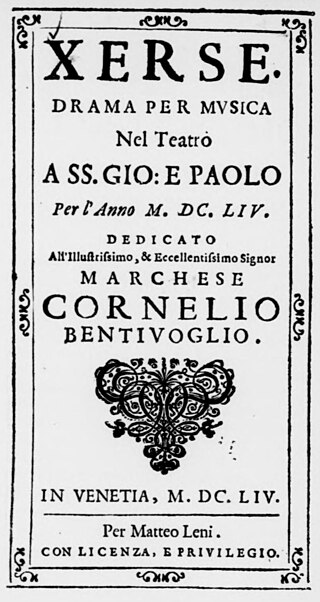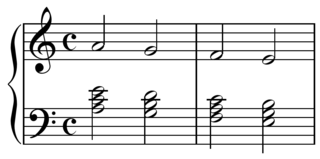
Daphne, a figure in Greek mythology, is a naiad, a variety of female nymph associated with fountains, wells, springs, streams, brooks and other bodies of freshwater.

Dafne is the earliest known work that, by modern standards, could be considered an opera. The libretto by Ottavio Rinuccini, based on an earlier intermedio created in 1589, "Combattimento di Apollo col serpente Pitone," and set to music by Luca Marenzio, survives complete. The opera is considered to be the first "modern music drama."

Italian opera is both the art of opera in Italy and opera in the Italian language. Opera was in Italy around the year 1600 and Italian opera has continued to play a dominant role in the history of the form until the present day. Many famous operas in Italian were written by foreign composers, including Handel, Gluck and Mozart. Works by native Italian composers of the 19th and early 20th centuries, such as Rossini, Bellini, Donizetti, Verdi and Puccini, are amongst the most famous operas ever written and today are performed in opera houses across the world.
Benjamin Bayl is a Dutch and Australian conductor who works with symphony and chamber orchestras, opera houses and period instrument orchestras in Europe, Asia and Australia.

The Teatro San Cassiano was the world's first public opera house, inaugurated as such in 1637 in Venice. The first mention of its construction dates back to 1581. The name with which it is best known comes from the parish in which it was located, San Cassiano, in the Santa Croce district (‘sestiere’) not far from the Rialto.

Il Xerse, usually written Xerse, is an Italian opera by Francesco Cavalli about Xerxes I. The libretto was written by Nicolò Minato and was later set by both Giovanni Bononcini and George Frideric Handel. Minato's plot outline is loosely based on Book 7 of Herodotus's Histories. The opera, consisting of a prologue and three acts, was composed in 1654 and first performed on 12 January 1655 at the Teatro SS. Giovanni e Paolo in Venice. It was dedicated to the Ferrarese nobleman Marchese Cornelio Bentivoglio.

L'Egisto (Aegisthus) is a 1643 opera in a prologue and three acts by Francesco Cavalli. It was designated as a favola dramatica musicale. The Italian libretto was by Giovanni Faustini, his second text for Cavalli.

Giovanni Francesco Busenello was an Italian lawyer, librettist and poet of the 17th century.

Ciro (Cyrus), also written Il Ciro, is a 1653 Italian drama per musica (opera) in a prologue and three acts with music by Francesco Provenzale and a libretto by Giulio Cesare Sorrentino. The story concerns the Persian king Cyrus the Great. The opera was probably first performed during Carnival of that year at the Teatro San Bartolomeo in Naples, in a production by Giovan Battista Balbi.

Artemisia is an opera in three acts and a prologue by the Italian composer Francesco Cavalli from a libretto written by Nicolò Minato. It was first performed at the Teatro San Giovanni e San Paolo, Venice on 10 January 1657 and revived in Naples in 1658, Palermo in 1659, Milan in 1663 and Genoa in 1665.

La Dafne (Daphne) is an early Italian opera, written in 1608 by the Italian composer Marco da Gagliano from a libretto by Ottavio Rinuccini. It is described as a favola in musica composed in one act and a prologue. The opera is based on the myth of Daphne and Apollo as related by Ovid in the first book of the Metamorphoses. An earlier version of the libretto had been set to music in 1597–98 by Jacopo Peri, whose Dafne is generally considered to be the first opera.

In music, the lament bass is a ground bass, built from a descending perfect fourth from tonic to dominant, with each step harmonized. The diatonic version is the upper tetrachord from the natural minor scale, known as the Phrygian tetrachord, while the chromatic version, the chromatic fourth, has all semitones filled in. It is often used in music to denote tragedy or sorrow.
Ensemble Elyma is an early music ensemble specialising in the baroque musical heritage of Latin America, led by Gabriel Garrido.

Le feste d'Apollo is an operatic work by Christoph Willibald von Gluck, first performed at the Teatrino della Corte, Parma, Italy, on 24 August 1769 for the wedding celebrations of Ferdinand, Duke of Parma and Archduchess Maria Amalia of Austria.

Die Dafne (1627) is an opera. Its libretto was written by Martin Opitz and its music was composed by Heinrich Schütz. It has traditionally been regarded as the first German opera, though it has also been proposed more recently that it was in fact a spoken drama with inserted song and ballet numbers.

Anders J. Dahlin is a Swedish tenor. He studied at the Music Conservatory Falun in Sweden, at the Norwegian Academy of Music in Oslo, and at the Royal Danish Academy of Music in Copenhagen.
Muziektheater Transparant is a Flemish theatre company founded in 1994. They produce music theatre and their own versions of operas. The artistic directors are Guy Coolen and Wouter Van Looy. Among the past and current composers in residence are Wim Henderickx, Jan Van Outryve, Eric Sleichim, Liesa Van der Aa and Annelies Van Parys.
Dafne in lauro is a chamber opera, a componimento per camera, composed by Johann Joseph Fux to a libretto by Pietro Pariati and performed for the imperial court before dinner on 1 October 1714 in the Favorita garden, Vienna, for the birthday of Emperor Charles VI. The opera is based on the myth of Apollo and Daphne, where Daphne pleads to Diana to be saved from Apollo's pursuit of her and is turned into a laurel tree.












